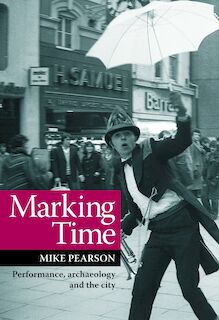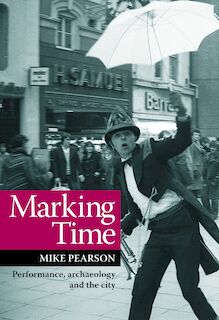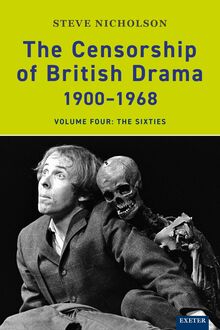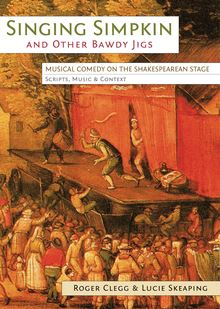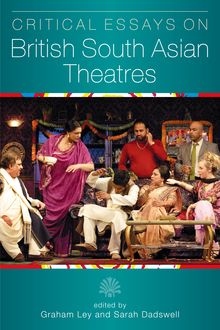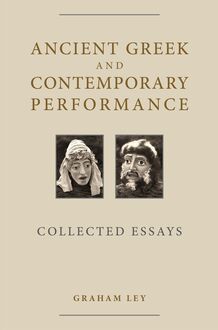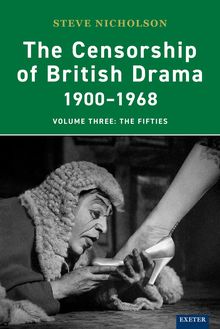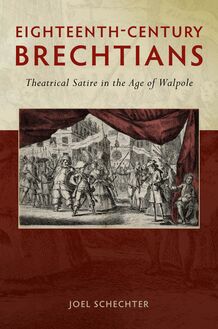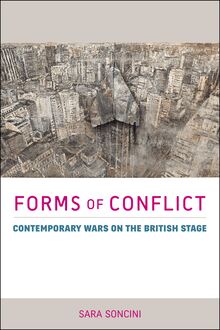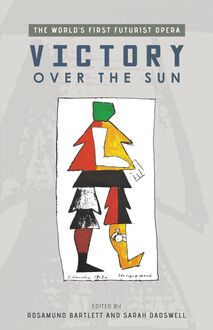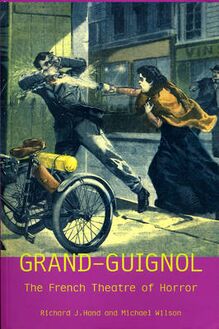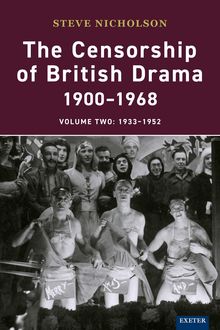The Censorship of British Drama 1900-1968 Volume 4 , livre ebook
290
pages
English
Ebooks
2015
Vous pourrez modifier la taille du texte de cet ouvrage
Obtenez un accès à la bibliothèque pour le consulter en ligne En savoir plus
Découvre YouScribe en t'inscrivant gratuitement
Découvre YouScribe en t'inscrivant gratuitement
290
pages
English
Ebooks
2015
Vous pourrez modifier la taille du texte de cet ouvrage
Obtenez un accès à la bibliothèque pour le consulter en ligne En savoir plus
Publié par
Date de parution
29 juillet 2015
Nombre de lectures
1
EAN13
9780859899888
Langue
English
Winner of the Society for Theatre Research Book Prize – 2016
This is the final volume in a new paperback edition of Steve Nicholson’s definitive four-volume survey of British theatre censorship from 1900-1968, based on previously undocumented material, covering the period 1960-1968. This brings to its conclusion the first comprehensive research on the Lord Chamberlain's Correspondence Archives for the 20th century. The 1960s was a significant decade in social and political spheres in Britain, especially in the theatre. As certainties shifted and social divisions widened, a new generation of theatre makers arrived, ready to sweep away yesterday’s conventions and challenge the establishment. Analysis exposes the political and cultural implications of a powerful elite exerting pressure in an attempt to preserve the veneer of a polite, unquestioning society.
This new edition includes a contextualising timeline for those readers who are unfamiliar with the period, and a new preface.
DOI: https://doi.org/10.47788/TGOJ9339
Acknowledgements
Timeline: The Political and Cultural Calender
Introduction: Galahad and Mordred
1. The Inflamed Appendix (1960-1961)
2. No Laughing Matter (1961-1962)
3. Pleasuring the Lord Chamberlain (1963)
4. Some S. I will not Eat (1964)
5. Blows for Freedom (1965)
6. Going Wild (1965-1966)
7. Getting Tough (1966)
8. An Affront to Constitutional Principles (1967)
9. Let the Sunshine In (1968)
10. Afterwords (1968-1971)
Notes
Select Bibliography
Index
Publié par
Date de parution
29 juillet 2015
Nombre de lectures
1
EAN13
9780859899888
Langue
English
The Censorship of British Drama 1900–1968
Volume Four: The Sixties
The fourth and final volume of the highly-praised analysis of British Theatre censorship from 1900 to 1968
This concluding volume in Steve Nicholson’s history of British theatre censorship under the Lord Chamberlain traces the key debates and conflicts from the beginning of the decade through until September 1968, when his rule ended. The 1960s was a significant decade in social and political spheres in Britain, not least in the theatre. As certainties shifted and social divisions widened, a new generation of theatre makers arrived, ready to sweep away yesterday’s conventions and challenge the establishment. The book describes the political and cultural implications of a powerful elite exerting pressure in an attempt to preserve the veneer of a polite, unquestioning society. A final chapter looks at the aftermath of the demise of censorship, showing how the new freedom began to be used.
Steve Nicholson is Professor of Twentieth-Century and Contemporary Theatre at the University of Sheffield and has published extensively in the areas of politics and theatre in Britain in the twentieth century, and of theatre censorship.
Exeter Performance Studies
Series editors : Peter Thomson, Professor of Drama at the University of Exeter; Graham Ley, Professor of Drama and Theory at the University of Exeter; Steve Nicholson, Professor of Twentieth-Century and Contemporary Theatre at the University of Sheffield.
A complete list of books published in the series is available from the publishers, University of Exeter Press: www.exeterpress.co.uk .
Other books by Steve Nicholson published by University of Exeter Press
British Theatre and the Red Peril: The Portrayal of Communism
The Censorship of British Drama 1900–1968: Volume One 1900–1932
The Censorship of British Drama 1900–1968: Volume Two 1933–1952
The Censorship of British Drama 1900–1968: Volume Three—The Fifties
First published in 2015 by
University of Exeter Press
Reed Hall, Streatham Drive
Exeter EX4 4QR
UK
www.exeterpress.co.uk
© Steve Nicholson 2015
The right of Steve Nicholson to be identified as author of this work has been asserted by him in accordance with the Copyright, Designs and Patents Act 1988.
British Library Cataloguing in Publication Data
A catalogue record for this book is available from the British Library.
ISBN 978 0 85989 846 1
Typeset in Plantin by
Kestrel Data, Exeter
Printed in Great Britain by
Short Run Press Ltd, Exeter
CONTENTS
Acknowledgements
Timeline The Sixties: A Cultural and Political Calendar
Introduction: Galahad and Mordred
1 The Inflamed Appendix (1960–1961)
2 No Laughing Matter (1961–1962)
3 Pleasuring the Lord Chamberlain (1963)
4 Some S. I will not Eat (1964)
5 Blows for Freedom (1965)
6 Going Wild (1965–1966)
7 Getting Tough (1966)
8 An Affront to Constitutional Principles (1967)
9 Let the Sunshine In (1968)
10 Afterwords (1968–1971)
Notes
Select Bibliography
Index
Acknowledgements
I would like to thank the following for their support, assistance and contributions to the research and the writing of this book.
The Arts and Humanities Research Board, whose grants were crucial in allowing me time (and funds) to research and complete this book.
The Society for Theatre Research and the University of Sheffield, both of whom also made generous grants to assist the process of research and publication.
Kathryn Johnson, Curator of Modern Drama at the British Library, and an expert at navigating the Lord Chamberlain’s archives.
Staff in the Manuscript Room of the British Library and staff at the Victoria and Albert Museum Theatre and Performance Archive.
Queen Elizabeth II for granting me permission to read and make use of material in the Royal Archive at Windsor.
Staff in the Royal Archive, especially the Registrar, Miss Pamela Clark.
University of Exeter Press and its Editorial Board, especially Simon Baker, Peter Thomson and Graham Ley.
And, as ever, Heather, Katya, Vikka, Pushkin, Toby and Olya.
TIMELINE
The Sixties:
A Cultural and Political Calendar
1960 PERFORMANCE POLITICAL/WORLD January February Wave of anti-Semitic attacks take place in Britain (and elsewhere) British Prime Minister Harold Macmillan makes his ‘Winds of Change’ speech in South African parliament, attacking apartheid March Harold Pinter’s The Dumb Waiter transfers to Royal Court (opened in January at Hampstead theatre club) Sharpeville Massacre in South Africa. ANC banned April The Two Gentleman of Verona opens in Stratford—Peter Hall’s first production and first season as director of RSC Harold Pinter’s The Caretaker opens at the Arts Theatre Eugene Ionesco’s Rhinoceros opens at Royal Court (Laurence Olivier in main role) Arnold Wesker’s I’m Talking about Jerusalem opens in Coventry, completing his trilogy, which plays at Royal Court from June Attempted assassination of Dr Henrik Verwoerd, South African prime minister Third CND Aldermaston march over Easter weekend against nuclear weapons culminates in huge ‘ban the bomb’ rally in Trafalgar Square France carries out nuclear test Civil Rights Bill passed in US May Terence Rattigan’s Ross opens at Haymarket with Alec Guinness as Lawrence of Arabia Leonid Brezhnev becomes President of the Soviet Union Soviet Union launches first unmanned space capsule American spy plane shot down over Soviet Union Nazi war criminal Adolf Eichmann captured in Argentina and sent for trial in Israel Military coup in Turkey June Brecht’s Galileo opens at Mermaid Theatre Lionel Bart’s Oliver! opens at New Theatre Somaliland (Somalia) becomes independent of British government Congo becomes independent of Belgium July RSC signs lease for London base at Aldwych Theatre Robert Bolt’s A Man for All Seasons opens at Globe Theatre The world’s first woman Prime Minister is elected in Sri Lanka (Ceylon) August Theatre Workshop’s Sparrers Can’t Sing opens at Stratford East Beyond the Fringe opens at Edinburgh Festival Cyprus gains independence from Britain East Germany imposes a partial blockade on West Berlin September Keith Waterhouse’s Billy Liar opens at Theatre Royal, Brighton, with Albert Finney October Franco Zeffirelli’s production of Romeo and Juliet opens at Old Vic Nigeria gains independence from Britain Britain agrees to allow US nuclear submarine bases; launch of first British nuclear submarine November J.F. Kennedy elected as US President Old Bailey trial of Penguin Books on grounds of obscenity for publishing D.H. Lawrence’s Lady Chatterley’s Lover ends with acquittal December Shelagh Delaney’s The Lion in Love opens at Royal Court Coronation Street first broadcast on television Last call up to National Service in Britain
Other countries to declare independence from former colonial regimes in 1960 include French Cameroon, Chad, Senegal, Togo, Madagascar, Ivory Coast, Dahomey, Upper Volta, Niger, Mali and Mauritania. The bloody Algerian War of Independence continues
Major Picasso exhibition takes place at the Tate; Soviet Union sends dogs into space; British government agrees to legalise betting shops; First use of traffic wardens in London; Final episode of The Goon Show broadcast on BBC Radio; The BBC Television Centre is opened
Significant new films released in 1960 include Sons and Lovers , Psycho , Spartacus , The Brides of Dracula , Saturday Night and Sunday Morning , Peeping Tom , La Dolce Vita , Whatever Happened to Baby Jane , The Time Machine
Rumour of the year in Plays and Players : Elvis Presley to play Hamlet at the Old Vic
1961 PERFORMANCE POLITICAL/WORLD January US breaks off diplomatic relations with Cuba February John Whiting’s The Devils opens at the Aldwych—first RSC production of a new play Thomas Middleton’s Jacobean Tragedy The Changeling revived at Royal Court Living Theatre’s controversial production of The Connection opens in West End March Theatre Workshop’s Sparrers Can’t Sing revived at Stratford East and transfers to Wyndham’s Theatre Chancellor of Exchequer reneges on promise of funds to build National Theatre, and switches money to regions Five people found guilty under the Official Secrets Act of spying for Soviet Union US nuclear submarine arrives at Scottish naval base of Holy Loch South Africa leaves British Commonwealth April Trial of Adolf Eichmann begins in Israel European Court of Human Rights opens in Strasbourg Sierra Leone declares independence from Britain Yuri Gargarin becomes first person in space and circles the earth Cuban refugees financed and trained by US invade Cuba (Bay of Pigs) in failed attempt to overthrow Castro May Jean Genet’s The Blacks opens at Royal Court Beyond the Fringe opens in London Amnesty International founded George Blake sentenced to 42 years in prison for spying for Russia South Africa becomes a Republic June Arnold Wesker’s The Kitchen opens in full production at Royal Court Kuwait declares independence from Britain July John Osborne’s Luther opens at Royal Court, with Albert Finney Centre 42 launched (under Arnold Wesker) to stimulate working-class participation in the arts Cyprus achieves independence from UK Extensive rioting and fighting in Algeria J.F. Kennedy declares that a Soviet attack on Berlin would be an attack on NATO August RSC production of Romeo and Juliet at Stratford with Dame Edith Evans as Nurse Adaptation of Lady Chatterley’s Lover staged privately at Arts Theatre Club Musical The Lord Chamberlain Regrets opens at Saville Theatre East Germany closes border with West Berlin and starts construction of Berlin Wall Britain applies to join EEC September Joan Littlewood announces she is leaving British theatre October Zeffirelli’s production of Othello opens at Stratford with John Gielgud in title role Edward Albee double bill opens at Royal Court ( The Death of Bessie Smith and The American Dream ) November British government introduces Commonwealt
